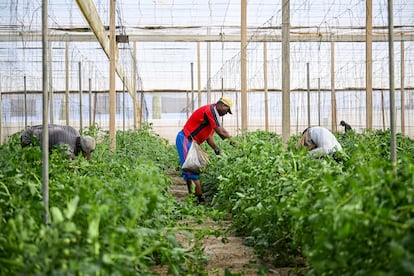It’s not a big blow for the PP. The arrests for allegedly irregular hiring of the president of the Provincial Council of Almería, Javier Aureliano García, also leader of the Almería party; of its vice-president Fernando Giménez, popular leader of the said province; and his companions Rodrigo Sánchez Simón, mayor of Fines, among others, represent a shock to the formation of Juan Manuel Moreno Bonilla in a traditional bastion, in a fulcrum of his power, where between 2019 and 2021 the popular ones carried out a replacement that left behind the era of the historic Gabriel Amat and brought fresh air. That fresh air is personified by García, now a prisoner.
The arrests made by the Central Operational Unit (UCO) of the Guardia Civil take place while the Andalusian government, with the absolute majority of the PP, tries to shake off the scandal over errors in tumor screening and while the investigation into alleged irregularities in the contracting of the Andalusian Health Service (SAS) continues. Elections are expected around June 2026.
When in Andalusia the PP still bore the stigma of the eternal defeated candidate, it already politically dominated the most right-wing province – both geographically and ideologically – of the southern community. The PP has held the position of mayor of the capital of Almería (202,000 inhabitants) since 1995, with only one interruption between 1999 and 2003. The councilor who held the position the longest was Luis Rogelio Rodríguez-Comendador (2003-2015), now a senator. In the Provincial Council, the People’s Party first came to power in 1995 and has held it continuously since 2011.
The president of the institution from 2011 until he took over from Javier Aureliano García was Gabriel Amat, the most important figure in the history of the Almería PP, of which he was at the helm for 17 years, from 2004 to 2021, when García also succeeded him. Summoned several times by the courts, but never convicted of any crime, Amat, 81 years old, has been mayor of Roquetas de Mar since 1995. When he took office, the city had 36 thousand inhabitants. Now there are around 110,000. There are those who call the municipality Roquetas de Amat.
First a farmer and then a builder, accused by the opposition of exploiting power for his own and his party’s advantage, but up to now safe from the blows of justice, the current councilor has passed the baton of leadership of the Provincial Council (2019) and of the PP (2021) to Javier Aureliano García, who has always presented himself as his successor, claiming his legacy. That is to say that the replacement in Almería did not happen from a breakup, but from an agreed transition. Amat is the honorary president of the greenhouse province party.
Graduated in Law, 48 years old, expert in New Generations, García’s promotion has come to give new air to a party whose financing has also been the subject of a judicial investigation, for the moment without a trial having taken place. The proceedings that initiated the case, divided into several parts, “are ongoing”, the Superior Court of Justice of Andalusia indicates through a spokesperson. “The Prosecutor’s Office has asked for the initial piece to be archived” and the investigating judge “has not yet ruled,” he adds.
Overwhelming at the polls
The PP maintains a solid position of power in Almería, the Spanish province where the highest percentage of active workers falls in agriculture, 20.5%, according to INE data. There the party has successfully repeated for decades a discourse in defense of agriculture at all costs, presented as a sector mistreated by the Council and the Government when the PSOE governs. It is a message, the one aimed against the Council, which has found fertile ground for a certain distrust towards the autonomous project. The autonomist referendum contained a leonine demand: that the yes vote would obtain an absolute majority of all those registered in the census in each province. Even if he voted in Almería Yes a resounding 82.7% of those who went to the polls, these represented only 42.3% of the census; This blocked the autonomy process for a while.

From the opposition, the PP presented itself as the party that defends an Almería presumably postponed by the Council. The party has always given great emphasis to the easternmost province. In both the 2008 and 2012 elections, Javier Arenas, candidate for the presidency of the Council, presented himself as the head of the list not for Seville, but for the province of Amat. The arrival of the PP in power in Andalusia after the regional elections in December 2018, meaning that Moreno Bonilla now cannot blame the leadership of Seville for Almería’s woes, has not diminished the attraction of the popular ones. His results in the province are triumphal.
In the 2022 regional elections, in which Moreno Bonilla obtained an absolute majority, the PP obtained 45.56% of the votes in Almería, only less than in Málaga (47.02%), the president’s homeland. However, the fine print of the Almeria result makes it even more creditable to the PP, which managed to surpass 45% while Vox surpassed the 20% threshold, far above its numbers in any other province. The second place where the far right reaches the highest percentage is Granada, with 15.41%. Between PP and Vox they exceeded 66% in the Almería regional elections. The right is hegemonic there.

In the 2023 municipal elections, the PP obtained 48.25% of the vote in Almería, more than in any other province in Spain. The director of this successful campaign was Fernando Giménez, one of those arrested this Tuesday. “Today Almería is painted blue,” celebrated the president of the PP and of the Provincial Council, Javier Aureliano García, a living image of success after those elections, when he boasted of the results of his formation in “very, very, very socialist fiefdoms”, such as the small municipalities of Purchena, Alcolea or Armuña del Almanzora.
The party of the seagull, or rather of the tern, presented itself once again in Almería for the 2023 general elections. With 40.94% of the votes, it was the only province in which the PP exceeded the 40% limit in Andalusia. Despite the strength of the People’s Party, Vox once again demonstrated its status as a growing threat, with 21.28%. Santiago Abascal’s party was swift this Tuesday in its reaction to the arrests. Its president announced in an interview with Telecinco, shortly after the news of the arrests, that Vox wants to appear as an accusation.
The arrests test the strength of the PP in a square, Almería, where more than twenty years ago it managed to emerge unscathed from a strong internal crisis which ended with the exit of Juan Enciso, then mayor of El Ejido (90,100 inhabitants), founder in 2005 of the personalist formation Partido de Almería, which ended up crushed by the popular party.
The president of the Council and of the PP, Moreno Bonilla, said on Tuesday morning that he did not yet have sufficient “information” to comment on the arrests. Subsequently, the PP suspended García, Giménez and Sánchez Simón from membership.
The left-wing opposition, with the PSOE as the main party, tries to present the arrests as a symptom of a larger problem, which affects the entire Almería PP. “This is the tip of the iceberg,” Andalusian socialist leader José María Martín said Tuesday. Antonio Maíllo, leader of the IU, said that “there has been a rotten smell in the PP of Almería for a long time”.



